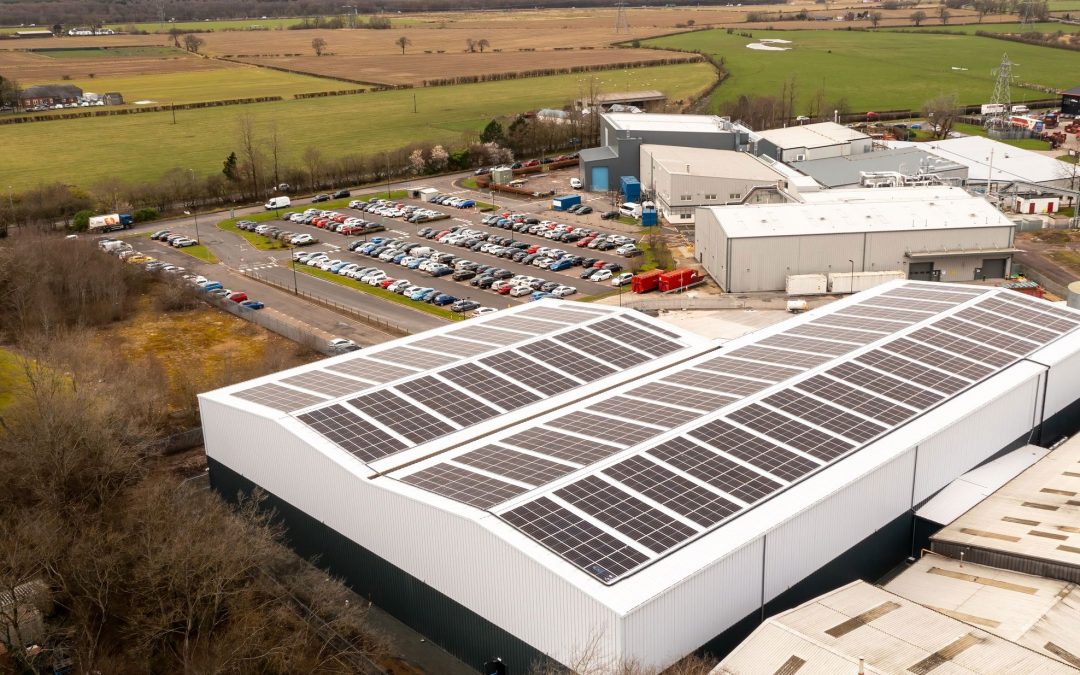Adopting renewable energy sources is becoming increasingly important in the fight against climate change. Among the various renewable energy options, rooftop solar power has gained significant attention due to its potential to generate clean electricity and reduce carbon emissions. Last year’s report from the UK Warehousing Association highlighted the benefits and feasibility of implementing rooftop solar photovoltaic (PV) panels in the warehousing industry emphasising the transformative impact of rooftop solar power on warehousing operations and the environment.
We’ve summarised the key findings of the report that emphasise the transformative impact of roof mount PV on warehouse operations and the environment.
The Potential of Rooftop Solar in Warehousing
The warehousing industry possesses immense potential for rooftop solar installations. Warehouses often have expansive roof spaces, which are ideal for accommodating solar panels. Furthermore, many warehouses operate during daylight hours, aligning with the generation period of solar power. By harnessing this potential, warehouses can generate clean energy onsite, significantly reducing their dependence on fossil fuels and grid electricity.
Economic Benefits of Rooftop Solar
One of the primary advantages is the economic viability of rooftop solar in the warehousing sector. The falling costs of solar technology, combined with government incentives and favourable financing options, make rooftop solar a financially attractive proposition. The report outlines various financial models, including power purchase agreements (PPAs) and self-consumption models, which enable warehouses to adopt solar power without substantial upfront investments. These models not only offer long-term cost savings but also provide a hedge against rising electricity prices.
Environmental Impact and Sustainability
Warehouses are known for their high energy consumption due to lighting, heating, cooling, and machinery operations. By embracing rooftop solar, warehouses can significantly reduce their carbon footprint and contribute to a more sustainable future. The widespread adoption of rooftop solar in the warehousing sector could substantially reduce greenhouse gas emissions. Additionally, solar power systems have a minimal environmental impact and require minimal maintenance, making them a greener alternative to conventional energy sources.
Operational Efficiency and Resilience
Beyond the economic and environmental benefits, the positive impact of rooftop solar on warehouse operations. Solar power installations can help warehouses achieve energy independence by generating their own electricity. This reduces reliance on the grid and mitigates the risks associated with power outages or fluctuations. By incorporating battery storage systems, warehouses can store excess solar energy and utilise it during peak demand or non-generating periods, further enhancing operational resilience.
Barriers and Solutions
Challenges such as lease agreements, building ownership, and limited awareness among stakeholders need to be addressed. The report suggests solutions such as collaboration between landlords and tenants, engaging with renewable energy experts, and promoting awareness campaigns to overcome these barriers. It emphasises the importance of industry-wide collaboration and supportive policies to drive the widespread adoption of rooftop solar in warehousing.
There are also constraints when it comes to connectivity to the grid, with some businesses waiting up to 15 years to secure a connection. The Environmental Audit Committee, which looks at green policies in government, is launching an inquiry into this to see what is causing delays and to find solutions.
Success stories
The report provides several case studies and success stories from companies that have already implemented rooftop solar in their warehousing operations. These case studies illustrate the positive impact of solar power on energy costs, carbon emissions, and operational efficiency. By showcasing real-world examples, the report aims to inspire and encourage other warehouses to follow suit, showcasing the benefits and potential for the entire industry.
Conclusion
There is transformative potential for rooftop solar installations in the warehousing sector. By adopting solar power, warehouses can achieve economic savings, reduce carbon footprint, enhance operational efficiency, and contribute to a more sustainable future. While there are challenges to overcome, the report presents solutions and case studies demonstrating rooftop solar’s feasibility and benefits in warehousing. It calls for collaboration among stakeholders, supportive policies, and increased awareness to unlock the full potential of solar energy in the industry. With its compelling evidence and comprehensive insights, the report serves as a valuable resource for warehouses considering a shift towards renewable energy. It showcases rooftop solar power as a sustainable solution for the future of warehousing.
If you have warehouses in your portfolio or run a factory that would benefit from solar PV then please get in touch.


Recent Comments